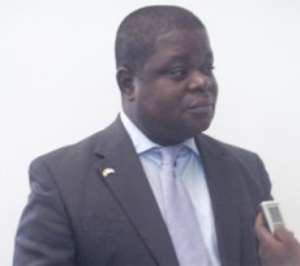
With a 60.8 per cent debt to GDP ratio Ghana has returned to the Highly Indebted Poor Country (HIPC) regime, an Economist with the University of Ghana and the Institute of Statistical Social and Economic Research [ISSER] has said.
Prof Peter Quartey said any rate above 60 per cent automatically puts a country into a HIPC category, stressing, the situation would become worse if the already acquired loans are not put into any productive use.
"If you contract a facility and consume [it] or use it to pay wages and salaries and the rest that is where the danger starts looming, because we are not able to repay the loan and that can have very dire consequences on the economy," he told Joy News' Francis Abban in an interview.
Asked if the current debt profile puts the country into the HIPC category, Prof Peter Quartey said: It [60.8% of GDP] puts us in the Highly Indebted category. Any rate above 60 per cent puts you in a HIPC category," he stated emphatically.
He was however quick to add that the country does not need an IMF bailout but rather be meticulous in how and what it spends the loans on.
The Finance Minister Seth Terkper late last week announced the country's debt profile during his presentation of the 2015 Budget statement.
“Ghana's public debt stock as a percentage of GDP has been rising over the years. It increased from 36.3 percent in 2009 to 48.03 percent in 2012 and further to 55.53 percent in 2013.
“As at end of September 2014, the debt stock stood at 60.8 percent, largely on account of increase in external net disbursements for infrastructure projects and net domestic issuance, and the depreciation of the cedi.
“The provisional public debt stock as at end September 2014,” the minister noted, “stood at GH¢69,705.90 million (US$21,733.51 million).”
Speaking to Joy News, the ISSER official is praying the loans accrued would not go into paying salaries.
He hoped the loans secured would go into productive investment.
Ghana declared itself HIPC in 2001 when its debts became largely unsustainable. The declaration led to the country benefitting from a huge windfall with donors forgiving the then Kufuor administration the debts incurred over the years.
However, years of borrowing means the country has crawled back into the HIPC category.
Joy Business' George Wiafe reported the IMF as saying the country's debt may be hitting a 70 per cent mark by close of the financial year.
At the moment, the country pays a little over 9billion cedis as interest on loans, Wiafe reported.
He said the country's debt portfolio may force the rating agencies to react.
He explained the rating agencies may tell investment partners to be careful lending to Ghana because with such a debt profile it would be risky granting loans to a country which may not have the potential to pay back.
At best, the country would be forced to borrow at an extremely higher rate than it would if it was not highly indebted.




 Former Kotoko Player George Asare elected SRC President at PUG Law Faculty
Former Kotoko Player George Asare elected SRC President at PUG Law Faculty
 2024 elections: Consider ‘dumsor’ when casting your votes; NPP deserves less — P...
2024 elections: Consider ‘dumsor’ when casting your votes; NPP deserves less — P...
 You have no grounds to call Mahama incompetent; you’ve failed — Prof. Marfo blas...
You have no grounds to call Mahama incompetent; you’ve failed — Prof. Marfo blas...
 2024 elections: NPP creates better policies for people like us; we’ll vote for B...
2024 elections: NPP creates better policies for people like us; we’ll vote for B...
 Don’t exchange your life for wealth; a sparkle of fire can be your end — Gender ...
Don’t exchange your life for wealth; a sparkle of fire can be your end — Gender ...
 Ghana’s newly installed Poland train reportedly involved in accident while on a ...
Ghana’s newly installed Poland train reportedly involved in accident while on a ...
 Chieftaincy disputes: Government imposes 4pm to 7am curfew on Sampa township
Chieftaincy disputes: Government imposes 4pm to 7am curfew on Sampa township
 Franklin Cudjoe fumes at unaccountable wasteful executive living large at the ex...
Franklin Cudjoe fumes at unaccountable wasteful executive living large at the ex...
 I'll 'stoop too low' for votes; I'm never moved by your propaganda — Oquaye Jnr ...
I'll 'stoop too low' for votes; I'm never moved by your propaganda — Oquaye Jnr ...
 Kumasi Thermal Plant commissioning: I pray God opens the eyes of leaders who don...
Kumasi Thermal Plant commissioning: I pray God opens the eyes of leaders who don...
